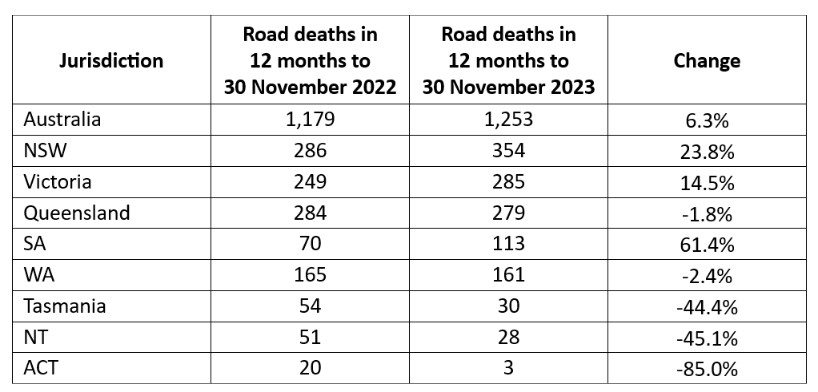New data shows road trauma killed 1,253 Australians in the 12 months to 30 November 2023 – a 6.3% increase on the preceding 12-month period. This is the highest 12-month road toll since March 2018.

New data shows road trauma killed 1,253 Australians in the 12 months to 30 November 2023 – a 6.3 per cent increase on the preceding 12-month period. This is the highest 12-month road toll since March 2018.

Bureau of Infrastructure and Transport Research Economics statistics.
The figures come less than a fortnight after federal and state governments failed to seize an opportunity to make meaningful progress on road safety reform at a ministerial meeting on Hobart.
AAA Managing Director Michael Bradley said: “Month after month, road deaths keep rising, and we lack the information needed to identify the reasons for this deadly trend and to develop the most effective measures for reducing crashes.
“The states and territories have crucial data on the quality of Australian roads, the causes of crashes, and law enforcement patterns – but they are not sharing this information.”
At a December 6 meeting in Hobart, state and federal transport ministers had been expected to discuss the next five-year National Partnership Agreement on Land Transport Infrastructure Projects, which will dictate how $50 billion in federal road funding is allocated to states and territories from July 2024 to mid-2029.
But the meeting made no progress toward the data transparency needed to reverse the alarming and ongoing increases in road deaths. The issue appears to have been shelved until the ministers meet again in the second quarter of 2024.
Mr Bradley said he was disappointed road safety reform had been kicked down the road.
“The Commonwealth allocates about $10 billion a year to state land transport infrastructure funding, yet road deaths keep rising,” he said.
“On December 6 politicians missed an opportunity to commit to using data to produce more effective road safety measures and enhance transparency. If crucial road safety data remains secret, there’s no way of knowing whether funding is being used to make roads safer or to win votes in target electorates.”
Early in October, the AAA began its Data Saves Lives campaign pressing for data transparency to improve road safety policies and accountability in road funding.
The campaign calls for the next NPA to include obligations for states and territories to report crucial road safety data on the causes of crashes, the state of our roads and police enforcement as a condition of receiving federal road grants. This would enhance transparency and experts could use the data to create more effective road safety policies.
Similar data-sharing requirements are in place for national health, education, and housing funding agreements.
Data Saves Lives is supported by all the nation’s motoring clubs as well as 17 national organisations representing motorists, motorcyclists, truckers, pedestrians, doctors, insurers, road engineers and safety advocates. Mr Bradley said the AAA would continue to argue for data transparency as a commonsense reform that will save lives on our roads.
“Until this reform is implemented, we will not be able to identify the reasons for rising road deaths and develop the most effective measures for reducing crashes – and doubts will remain about pork-barrelling in road funding decisions,” he said.
The AAA’s proposals have now been endorsed by all Liberal, National, Greens and Teals MPs in the House of Representatives. But with only one exception, Labor MPs have declined to support road safety data transparency.

The Federal Government must explain its continued refusal to implement the road safety reforms it announced just days before the 2022 Election, as new data shows Australia’s road toll continues to climb.
read more
The Queensland Government has agreed to share with the Commonwealth and the public previously secret data about the causes of car crashes, traffic policing and the condition of roads to help tackle the escalating road safety crisis.
read more
The quarterly update of the AAA’s EV Index shows Australians are continuing to shift towards electric vehicles and that internal combustion engines’ market share continues to decline.
read more